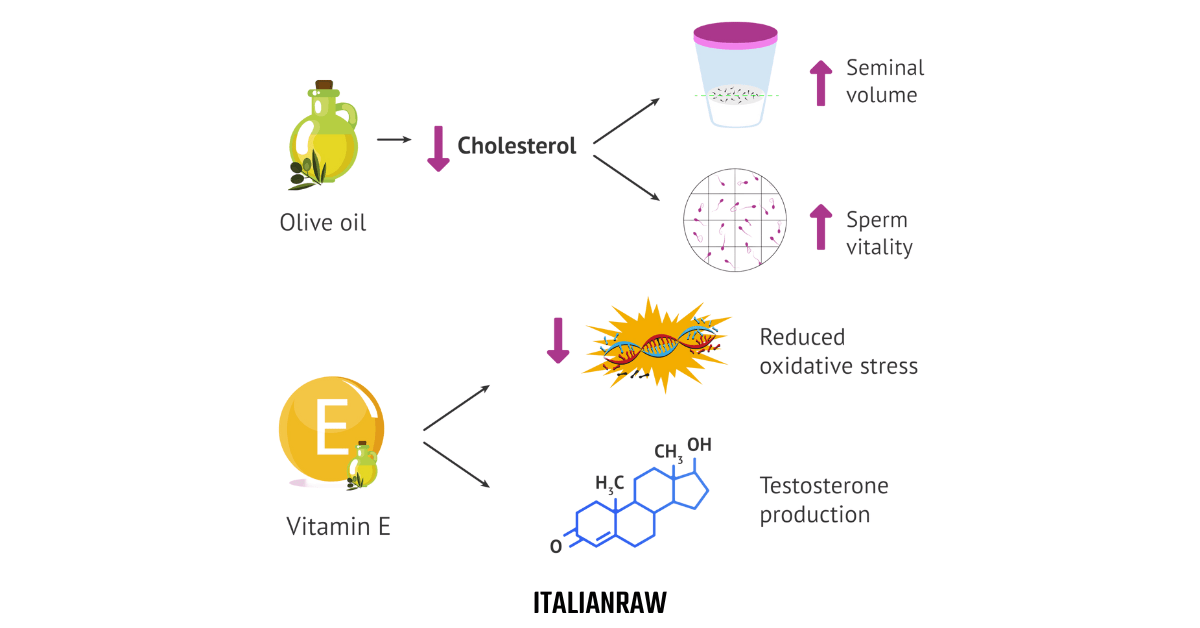
Olive Oil and Sperm Health: What Does Science Say?
Olive oil has long been revered for its health benefits, primarily due to its high content of monounsaturated fats and various bioactive compounds, including antioxidants. Among the various health implications of olive oil consumption, there’s been interest in its potential effects on male fertility, particularly sperm health.
Infertility is a global health problem, defined as the inability to get pregnant after 1 year of unprotected sexual intercourse. It involves approximately 15% of couples worldwide, and male factors account for 40%-50% of the cases.
There are multiple factors that affect infertility, which include genetic disorders, dietary habits, lifestyle, and environment factors. Etiopathogenesis of male infertility involves diverse aspects, and oxidative stress is one of them.
Several factors can influence sperm health, including diet. Antioxidants have long been used for infertility treatment as they are easily available at a low cost. In fact, the imbalance of free radicals and antioxidants in sperm leads to DNA fragmentation (DNA strand breaks).
Dietary fat, in particular, has been a focus of many studies investigating its potential impact on male fertility.
scientific findings about olive oil and sperm's quality

1. Olive Oil and Sperm Morphology
In a 2017 study published in the journal Endocrinologia Diabetes y Nutricion, researchers found that a diet rich in olive oil positively affected sperm morphology compared to a diet rich in other fats.
- Nine articles were included in this study.
- Four studies revealed a statistically significant reduction of sperm DNA fragmentation.
- Sperm concentration, sperm motility, and morphology were also increased after antioxidant supplementation.
- Pregnancy rates were reported in 3 studies; the rates increased in 2 studies, and similar rate to placebo group was observed in 1 study.
Conclusion
Antioxidant supplementation can counteract oxidative stress and improve the spermatogenesis process reflected by a decrease of DNA Fragmentation Index (DFI), improvement of sperm parameters, and elevation of pregnancy rates confirmed by those included studies.
2. Effect on Sperm Parameters
A study conducted in 2015, as published in Folia Medica, showed that rats fed with virgin olive oil had improved sperm parameters, suggesting potential protective effects against testicular damage.
- Extra virgin olive oil has been shown to be effective against oxidative stress-associated diseases. In addition to the high quantities of oleic acid, it is rich in phenolic compounds.
- The researchers investigated the protective efficacy of extra virgin olive oil (EVOO) against the hepatotoxicity induced by both aluminum and acrylamide.
- The co-administration of EVOO to acrylamide and aluminum-treated rats restored their hepatic markers to near-normal values.
2. Oxidative Stress and Sperm DNA
- Oxidative stress plays a pivotal role in sperm DNA fragmentation, which can impact fertility. Olive oil, known for its antioxidative properties, might help reduce this oxidative stress, as evidenced by the aforementioned study in Endocrinologia Diabetes y Nutricion.

KEY TAKEAWAYS
- Infertility can be caused by poor sperm quality.
- Olive oil is rich in tocopherols, commonly known as vitamin E. This particular vitamin, recognized for its strong antioxidant attributes, has connections to male fertility.
- The imbalance of free radicals and antioxidants in sperm leads to DNA fragmentation. Sperm cells can be vulnerable to oxidative stress. Given that sperm membranes are abundant in polyunsaturated fatty acids prone to oxidation, such stress can potentially compromise the membranes and the integrity of sperm DNA, thereby impacting their functionality.
- The antioxidant capabilities of vitamin E might shield sperm cells from such adversities.
- Antioxidant supplementation can counteract oxidative stress and improve spermatogenesis.
IMPORTANT FINAL CONCLUSIONS
While the evidence suggests that olive oil may have positive effects on male fertility parameters, particularly sperm health, more extensive human studies are needed to draw concrete conclusions.
Animal studies and smaller human trials provide promising leads, but larger, well-designed human studies will offer clearer insights.
It’s essential to integrate such findings into a broader understanding of fertility, which is influenced by a myriad of factors, including genetics, lifestyle, other dietary components, and overall health.
Note: Always consult with a healthcare professional or specialist when considering dietary changes for health concerns, including fertility.
REFERENCES FOR THIS ARTICLE
DISCLAIMER
The information provided in this blog post is for educational and informational purposes only and should not be construed as medical advice.
The content is not intended to be a substitute for professional medical advice, diagnosis, or treatment. Always seek the advice of your physician or other qualified healthcare provider with any questions you may have regarding a medical condition. Never disregard professional medical advice or delay in seeking it because of something you have read on this website. The author and publisher of this blog post are not responsible for any adverse effects or consequences resulting from the use of any suggestions or procedures described hereafter.
LEGAL NOTE
Statements made on this website have not been evaluated by the FDA. This product is not meant to cure, treat, prevent, or diagnose a disease.










Leave a Reply